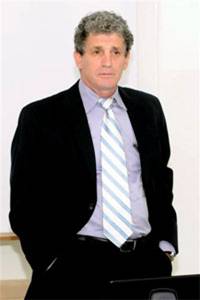
The patient was 30 years old and he was dying. His liver–scarred beyond repair by cirrhosis that followed a hepatitis B infection 18 years earlier–was scarcely functioning.
He had been hospitalized at the Hadassah–Hebrew University Medical Center in Jerusalem for almost two months waiting for a donor liver before one became available.
“The doctors didn’t pull any punches,” he says. “They told me that the liver was from a hugely obese 75-year-old donor, which meant that it was certainly old and could be fatty. They told me the risks and said straight out it wouldn’t be their first choice. But the fact was there no longer was any choice. Time had run out and there was no more suitable liver available. I talked it over with my wife and my parents. We all agreed I should go for the transplant.”
For this patient the story ended well. Surgery went smoothly. The donor liver was not fatty and functioned well from the beginning. With no complications, the young man was discharged from the hospital 10 days after the transplant.
“We’ve become far more aggressive in our approach,” says Dr. Hadar Merhav, the new head of the organ-transplantation-surgery unit at the medical center. “We are taking sicker patients and applying extended criteria to the organs we offer them. This can have a price in terms of complications, but with mortality on the waiting list as high as it is, and the waiting list for donor organs as long as it is–both in and outside Israel–there is often no alternative, and physicians and patients must face difficult decisions.”
In 1988, Hadassah was designated one of Israel’s two centers for liver transplantation (following designation as Israel’s first heart-transplant center in 1986), but transplant surgery there has slowed dramatically in recent years. In mid-2008, the transplant unit’s longtime head, Dr. Ahmad Eid, moved to Hadassah–University Hospital on Mount Scopus to head its surgery division, and the unit spent several months without significant leadership until Dr. Merhav was appointed.
Jerusalem-born and a graduate of the Hadassah–Hebrew University School of Medicine, Dr. Merhav comes to the job after spending most of the past 20 years in leading liver transplant centers in the United States. And he comes with a vision for Hadassah’s transplant unit.
“First and most pressing, we must increase the volume of transplants performed, and so ensure that Hadassah is a prominent referral center for kidney and liver transplantation,” he says. “Second, I want to venture into transplantation of other abdominal organs, such as the pancreas and small intestine. And third, I’m introducing new techniques to Hadassah’s [and Israel’s] organ-transplant programs–from laparoscopy to robotic surgery.”
Dr. Merhav, 57, became a transplant surgeon almost by chance. He completed a residency in general surgery under Dr. Reuven Pfefferman, one of Israel’s first kidney-transplant surgeons. Then, in 1987, four years after graduating, he attended a lecture by American surgeon Dr. Thomas E. Starzl, the modern-day father of organ transplantation. (Nine years later, the Pittsburgh Transplant Institute, where Dr. Starzl worked renamed itself the Thomas E. Starzl Transplant Institute.)
“From that moment, I was fascinated by the prospect of organ transplantation, especially transplantation of the liver,” says Dr. Merhav. “I had planned a fellowship in noncardiac thoracic surgery, but, instead, wrote to Dr. Starzl. One evening in April, the phone rang. My wife said, ‘There’s this guy Starzl on the phone.’ I grabbed it! He offered me a two-year fellowship starting that July. And that’s how I became a transplant surgeon.”
Following the fellowship and a stint as an attending physician in charge of intensive care, Dr. Merhav was invited by Dr. Nazih Zuhdi to open a liver-transplant program at the 500-bed Baptist Medical Center in Oklahoma City. He returned to Israel in 1995 as chief of liver surgery at The Tel Aviv Sourasky Medical Center. During a seven-year tenure, he launched a liver-transplant program that became, within two years, the second largest in Israel. Then it was back to the United States as an associate professor at the Memorial Hermann–Texas Medical Center’s Liver Center. With his mentor Dr. Luis Mieles, he was charged with reviving its faltering liver-transplant program–which they did.
“In 2008, I was invited to head Hadassah’s organ-transplantation unit,” he says. “It was the right job at the right time. After 26 years, I came back to Hadassah.”
He started his new job in 2009 and, within weeks, he was involved in an organ-transplant marathon. In the course of 48 hours last July, two hearts, two livers and a kidney were transplanted at Hadassah–Ein Kerem. One of the liver patients was a 24-year-old from Tiberias and the other a 61-year-old woman from Kiryat Arba. The kidney-transplant patient is 28. They and the two heart patients are all now at home in good health.
To read the remainder of the article, click here.
